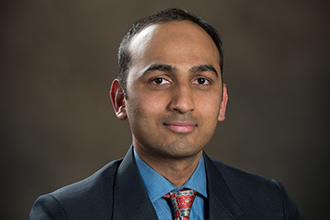St. Michael’s Outpatient Stroke and Neurology Clinic proves highly specialized care can be delivered quickly

By Maria Sarrouh

Dr. Atif Zafar
Dr. Atif Zafar and his team of stroke neurologists are ushering in a new era of stroke care in Toronto, and it all starts at St. Michael’s. The first step? Improving patient and physician access to the Outpatient Stroke and Neurology Clinic.
Leaving behind a life in Albuquerque, New Mexico, the Medical Director of the St. Michael’s Stroke Program stepped into his new role in August. After spending three weeks speaking to the Chief of Family Medicine and other family doctors to understand what they needed from the Stroke Program, he identified a major issue. It could take weeks, if not months, for patients to be evaluated. This was largely due to patients being turned away if more information or testing was required of them or their physician.
“What I’ve seen is that highly specialized care in Toronto requires a lot of waiting. And that’s what I’ve really focused on changing,” Dr. Zafar said.
The new Outpatient Stroke Clinic is able to perform an initial evaluation within a week of receiving a referral because it does not require patients to arrive with all the testing they need. To ensure additional testing is conducted more quickly, the clinic has built partnerships with radiologists and cardiologists.
“We’re providing solutions rather than creating the bureaucratic work that was typically needed,” Dr. Zafar said. “In the end, our main goal is to be patient-focused. We need to make their lives easier.”
Dr. Zafar and his team are working to maintain St. Michael’s legacy as a leader in stroke prevention, while broadening the stroke program’s services to include highly specialized areas of stroke care. Three new specialty-trained stroke and vascular neurologists were hired within a year of the clinic’s opening – a noteworthy achievement, Dr. Zafar said.
He explained that he intends to make St. Michael’s a “centre for excellence” in the treatment of cerebral cavernous malformations, which are rare abnormalities of the blood vessels in the brain. Another very specialized area of stroke care the clinic is equipped to treat is Moyamoya syndrome, a rare, progressive blood vessel disorder that may cause recurring strokes in patients.
The Stroke and Neurology Clinic has launched a virtual protocol for stroke patients during the COVID-19 pandemic. A guide is available for clinicians who want to send the clinic a virtual referral and patients looking to schedule an appointment.
“We can see patients right away. There’s a step-by-step approach for folks who are unexperienced with mobile phones or the internet on how to login and book,” Zafar said. “On the other end, they will find us, taking care of their health.”
About St. Michael’s Hospital
St. Michael’s Hospital provides compassionate care to all who enter its doors. The hospital also provides outstanding medical education to future health care professionals in more than 27 academic disciplines. Critical care and trauma, heart disease, neurosurgery, diabetes, cancer care, care of the homeless and global health are among the Hospital’s recognized areas of expertise. Through the Keenan Research Centre and the Li Ka Shing International Healthcare Education Centre, which make up the Li Ka Shing Knowledge Institute, research and education at St. Michael’s Hospital are recognized and make an impact around the world. Founded in 1892, the hospital is fully affiliated with the University of Toronto.
About Unity Health Toronto
Unity Health Toronto, comprised of Providence Healthcare, St. Joseph’s Health Centre and St. Michael’s Hospital, works to advance the health of everyone in our urban communities and beyond. Our health network serves patients, residents and clients across the full spectrum of care, spanning primary care, secondary community care, tertiary and quaternary care services to post-acute through rehabilitation, palliative care and long-term care, while investing in world-class research and education. For more information, visit www.unityhealth.to.
